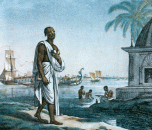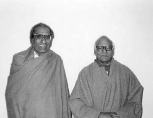 "The Church inviting Hindus for an interfaith dialogue while going ahead with converting weaker sections of Hindu society through force, fraud and allurements, is like a pickpocket preaching virtues of renunciation to a man while relieving him of his purse. Hindu scholars and sanyasins must make stoppage of conversions by Church in theory and practice as a pre-condition to their participation in any interfaith dialogue." - Virendra Parekh
"The Church inviting Hindus for an interfaith dialogue while going ahead with converting weaker sections of Hindu society through force, fraud and allurements, is like a pickpocket preaching virtues of renunciation to a man while relieving him of his purse. Hindu scholars and sanyasins must make stoppage of conversions by Church in theory and practice as a pre-condition to their participation in any interfaith dialogue." - Virendra Parekh
 "Vade vade jayate tattvabodhah" (Every debate brings forth understanding of principles), says a Sanskrit subhashita. In their long history, Hindus as a people have been fond of discussing matters of religion, philosophy and spirituality, among themselves and with others. In spite of what Islam and its votaries had done to Hindus and their civilization, Brahmins participated in discussions organized by some Muslim rulers between scholars of different faiths. When a German missionary Bartholomäus Ziegenbalg (1682-1719) sent in 1712 a large number of letters to a selection of Hindus inviting answers to a number of questions, he received no fewer than 104 responses.
"Vade vade jayate tattvabodhah" (Every debate brings forth understanding of principles), says a Sanskrit subhashita. In their long history, Hindus as a people have been fond of discussing matters of religion, philosophy and spirituality, among themselves and with others. In spite of what Islam and its votaries had done to Hindus and their civilization, Brahmins participated in discussions organized by some Muslim rulers between scholars of different faiths. When a German missionary Bartholomäus Ziegenbalg (1682-1719) sent in 1712 a large number of letters to a selection of Hindus inviting answers to a number of questions, he received no fewer than 104 responses.
Christianity, on the other hand, has traditionally preferred monologue i.e. it alone talked and others were made to listen. It was ensured in advance that the monologue was not disturbed by arguments from the other side. Convinced that it had the monopoly of Absolute Truth which others had to accept from it in all humility, it saw no need for holding any dialogue with any kind of paganism.
But times have changed. The collapse of Christianity in the West and the retreat of Western imperialism have forced the Church to change its methods. Buyers of its stale and discredited merchandise are becoming increasingly scarce. Gone are the days when the Church spoke and others had to listen. It can no longer use the might of the state (once described as secular arm of the church) to crush the adversaries. So, now the church is not just prepared to enter into a dialogue with heathens, it is actually organizing it.
But the Church is uncomfortable with the new environment. It knows, from its experience in the West, what reason and open inquiry can do to its dogma. At the same time, the closed and arrogant mindset, fashioned by centuries of dominance, has not changed. Short-term tactics have changed, but the long-term goal remains unaltered. There is a change in the language, but not in the ideology. These show a striking continuity over the centuries.
 For instance, annals of the mission record one instance of a public debate in sixteenth century Goa, when Jesuits, aided by a convert, deputed with pundits. After a while, forty pundits were banished from the debate for "proving obstinate." No more dialogues were held in Portuguese possessions thereafter.
For instance, annals of the mission record one instance of a public debate in sixteenth century Goa, when Jesuits, aided by a convert, deputed with pundits. After a while, forty pundits were banished from the debate for "proving obstinate." No more dialogues were held in Portuguese possessions thereafter.
Writing four hundred years later, Richard Fox Young, who records this incident in his Resistant Hinduism (Vienna, 1981, pp. 20-21), concludes that Hindu tolerance towards other religions is a myth because Hinduism resisted Christianity instead of accommodating it! The author sees nothing wrong with the wanton Christian onslaught of which he himself provides prolific proof.
 In our own day, the ex-communication is practiced in a more sophisticated way. Fr. Francis Xavier Clooney, professor at Harvard Divinity School, says that in the past Swami Dayanand Saraswati and Swami Vivekanand had attempted a critical look at the West from a Hindu perspective, but post-colonial authors like Ram Swarup and Sita Ram Goel had politicized the Hindu-Christian relationship. In other words, even the adversaries of the Church need a character certificate from it before their contributions are recognized. And the grant of that certificate depends on the degree of accommodation shown by the Hindu scholar to Christianity, especially to conversions.
In our own day, the ex-communication is practiced in a more sophisticated way. Fr. Francis Xavier Clooney, professor at Harvard Divinity School, says that in the past Swami Dayanand Saraswati and Swami Vivekanand had attempted a critical look at the West from a Hindu perspective, but post-colonial authors like Ram Swarup and Sita Ram Goel had politicized the Hindu-Christian relationship. In other words, even the adversaries of the Church need a character certificate from it before their contributions are recognized. And the grant of that certificate depends on the degree of accommodation shown by the Hindu scholar to Christianity, especially to conversions.
 Fr. Clooney would have been within his rights as well as bounds of a healthy dialogue if he had pointed out where these authors had misquoted a source, or quoted it out of context, and how the context altered the apparent meaning, or used logic which was not straight, or passed a value judgment which was not valid. But that is not on his agenda. The Church has no use for authentic scholars like Ram Swarupji or Sita Ramji precisely because their critique is too comprehensive, too accurate and too fundamental for its comfort.
Fr. Clooney would have been within his rights as well as bounds of a healthy dialogue if he had pointed out where these authors had misquoted a source, or quoted it out of context, and how the context altered the apparent meaning, or used logic which was not straight, or passed a value judgment which was not valid. But that is not on his agenda. The Church has no use for authentic scholars like Ram Swarupji or Sita Ramji precisely because their critique is too comprehensive, too accurate and too fundamental for its comfort.
... deleted, see below for URL
Acknowledgment » The author is Executive Editor, Corporate India, and lives in Mumbai
No comments:
Post a Comment